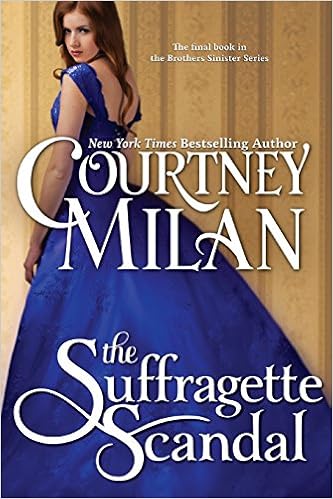 the suffragette scandal is the last full novel in the brothers sinister series, i've read the previous three books and liked them, but none of them moved me as much as this one did. i think because i've been thinking a lot about women's rights these past couple of days--the stanford rape case and the white male privilege that earned a rapist 6 months in county jail and 3 months probation because a harsher sentence would impact his future adversely with no consideration given to the woman he raped while unconscious and how his acts had violated her future? or hillary clinton essentially securing the democratic presidential nomination and still having to face opposition from a white man who claims a system is rigged. when the fact of the matter is she is a woman of more political savvy as well as a politician who has earned more than 4 million votes cast than he has! No candidate is perfect, but the misogyny that clinton deals with on a daily basis because she has chosen a hard, difficult path and succeeded, it moves me.
the suffragette scandal is the last full novel in the brothers sinister series, i've read the previous three books and liked them, but none of them moved me as much as this one did. i think because i've been thinking a lot about women's rights these past couple of days--the stanford rape case and the white male privilege that earned a rapist 6 months in county jail and 3 months probation because a harsher sentence would impact his future adversely with no consideration given to the woman he raped while unconscious and how his acts had violated her future? or hillary clinton essentially securing the democratic presidential nomination and still having to face opposition from a white man who claims a system is rigged. when the fact of the matter is she is a woman of more political savvy as well as a politician who has earned more than 4 million votes cast than he has! No candidate is perfect, but the misogyny that clinton deals with on a daily basis because she has chosen a hard, difficult path and succeeded, it moves me.as a woman these things move me, and this book moved me too. there is a moment when free talks with edward about why she fights even when faced with implacable obstacles. and she says that even if she is draining the river with thimbles, think of all the good she is doing with that water, crops grown, houses cleaned, big things, small things. she tells him that for all that he can only see the river, she can see the roses.
i feel like you guys need to see some of the words of that argument:
“You women will squawk amongst yourselves about injustice and fairness. Maybe if you do it loudly enough, someday a handful of you will be allowed to vote, and it will be accounted a great victory. Maybe in fifty years, women will achieve a distinct minority in the professional classes. We might have a woman doctor, a woman barrister, and then five or ten of you might form an organization together and shake hands because something has been accomplished.” Free let out a breath. “Maybe in a hundred years of women voting, you might manage a single female Prime Minister.” He gave her a rough smile. “But just the one, and even so, people will never take her seriously. If she’s stern, they’ll blame her menstrual cycle. If she smiles, it will be proof that women are not strong enough to lead. That’s what you’re setting yourself up for, Miss Marshall. A lifetime of small wins, of victories that land like lead in your stomach. Your cause may be just. But you’re delusional if you think you can accomplish anything. You’re pitting yourself against an institution that is older than our country, Miss Marshall. It’s so old that we rarely even need speak of it. Rage all you want, Miss Marshall, but you’ll have more success emptying the Thames with a thimble.”
[***]
“You’re right,” Free said, shutting her eyes. He blinked and sat back, cocking his head. “What did you say?”
“I said you were right,” Free repeated. “You’re right about all of that. If history is any guide, it will take years—decades, perhaps—before women get the vote. As for the rest of it, I imagine that any woman who manages to stand out will be a target for abuse. She always is.” His eyes crinkled in confusion. “What I don’t understand is why you think you need to lecture me about this at all. I run a newspaper for women. Do you imagine that nobody has ever written to me to explain precisely what you just said?”
He frowned. “Well.”
“Do you suppose I’ve never been told that I’m upset because I am menstruating? That I would calm down if only some man would put a child in my belly? Usually, the person writing offers to help out with that very task.” She swallowed bile in memory. “Shall I tell you what someone painted on my door one midnight? Or do you want to read the letters I receive?” Free wrapped her arms around herself. “I am here, on the floor of my press, because I told a man I wouldn’t bed him, and so he burned my house down. So, yes, Edward. I know the obstacles women face. I know them better than you ever will.” He exhaled harshly. “God, Free.” “Do you think I don’t know that the only tool I have is my thimble? I’m the one wielding it. I know. There are days I stare out at the Thames and wish I could stop bailing.” Her voice dropped. “My arms are tired, and there’s so much water that I’m afraid it’ll pull me under. But do you know why I keep going?”
He reached out and touched her chin. “That’s the one thing I can’t figure out. You don’t seem stupid; why do you persist?”
She lifted her face to his. “Because I’m not trying to empty the Thames.” Silence met this. “Look at the tasks you listed, the ones you think are impossible. You want men to give women the right to vote. You want men to think of women as equals, rather than as lesser animals who go around spewing illogic between our menstrual cycles.[...] But we’re not trying to empty the Thames,” she told him. “Look at what we’re doing with the water we remove. It doesn’t go to waste. We’re using it to water our gardens, sprout by sprout. We’re growing bluebells and clovers where once there was a desert. All you see is the river, but I care about the roses.”
that entire scene just moves me. i don't strongly identify with feminism, but i believe that women deserve more than we are often given and i admire those that fight the fight every day. i admire those who see the roses. the stanford victim, she sees the roses. so do the two bicyclists who saved her. so does joe biden. hillary clinton sees the roses too, she has to or she would have given up so long ago. and so do frederica and edward. they see the roses--willingly and unwillingly. and the love story that frames this story makes it only that much sweeter. these are two characters who have faced hard truths, and they still rise above it all. their happy ending is wonderfully earned, and it's also perfectly in character. i read this book at exactly the right moment, but i think it will hold up well. it's definitely a keeper.

Comments
Post a Comment
Comments are moderated. No spam please. Let's keep things fun and nice and respectful.